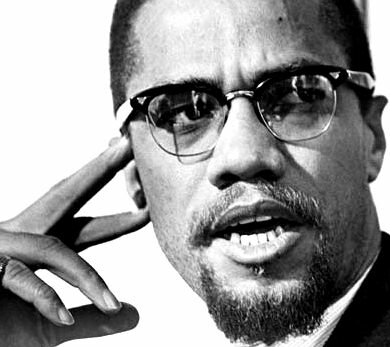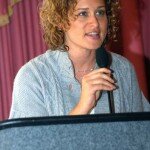Why Lord?
Featured, Politics — By Duchess Harris on February 28, 2010 at 10:26“Black America stands at the precipice. African American unemployment is at its highest in 25 years. Thirty-five percent of our children live in poor families. Inadequate healthcare, rampant incarceration, home foreclosures, and a general sense of helplessness overwhelm many of our fellows,” said Princeton Professor Eddie Glaude, Jr., Ph.D. in his recent The Huffington Post article, “The Black Church is Dead.”
Glaude laments the absence of press conferences and impassioned efforts around black children living in poverty, and organizing for jobs and health care reform, in lieu of anti-abortion and anti same sex-marriage protests.
For those of you who are not familiar with Humanism, they would prioritize prison reform, and value that as a “right to life. “So I’d like to ask Black Christians, “Can you afford to dismiss the Humanists, the way some dismissed Malcolm X because he wasn’t a Christian?”
Two days after Glaude’s blog posting, representatives of the Obama Administration met with about 60 people with the Secular Coalition for America although the President did not attend.
Leaders of the Coalition’s 10 member groups billed their visit as an important meeting between a presidential administration and the nontheist community. They discussed three policy areas: child medical neglect, military proselytizing and faith-based initiatives.
Says coalition executive director Sean Faircloth: “Despite what we hear from Glenn Beck or Sarah Palin, we’re in a stage in history where millions upon millions of Americans share a secular perspective on American public policy. We think the real ’silent majority,’ if you will, is the Americans who say, ‘Enough of this religious and even theocratic nature to American policy.”
The coalition doesn’t embrace all of the Obama administration’s stances, but members feel that they have more of a kindred spirit in this president than in his predecessor. Obama’s late mother was spiritual but agnostic. His inaugural address was the first by a U.S. president to include explicit recognition of nonbelievers as part of the fabric of the nation.
Bishop Council Nedd, Chairman of the Christian advocacy group In God We Trust, , slammed the administration, saying, “It is one thing for Administration to meet with groups of varying viewpoints, but it is quite another for a senior official to sit down with activists representing some of the most hate-filled, anti-religious groups in the nation.”
I think I’ll save my commentary on the appropriation of Civil Rights language by the historically racist conservative Right for another time.
Let’s just say I wasn’t surprised that the same evening the meeting occurred, Sean Hannity went even further, accusing the Obama administration of a pattern of hostility towards religion. On his Friday evening show, his guest, the former Governor of Arkansas Mike Huckabee, said that evangelicals were disappointed because many had supported Obama.
Evidently Obama is supposed to chose: Humanism or Hannity?
It’s a flawed choice, one I’ve been struggling with for ten years. When I was going through the tenure process at Macalester College, I learned that my chair was a humanist. In 2000, I wasn’t quite sure what that meant. I spent a lot of time in his office and he would point out that, since the time of slavery, American Blacks have been critiquing the questionable, traditional Christian narrative that suffering is redemptive and should therefore be accepted and rather than resisted.
The Humanist alternative in African American spiritual life traces its roots at least as far back as the criticism of reactionary tendencies within religion by thinkers Frederick Douglas and W.E.B. Du Bois, the agnosticism of former Pentecostal child preacher James Baldwin, the socialist-influenced irreligious stances of Langston Hughes and Huey P. Newton, the full-fledged modern Humanism of Zora Neale Hurston and Alice Walker, recipient of the prestigious American Humanist of the Year award in 1997.
And if there was anyone who decried the redemptive value of suffering by Black people, it was Malcolm. Some of it though, may have been hard for African American Christians to hear: “Brothers and sisters, the white man has brainwashed us black people to fasten our gaze upon a blond haired, blue-eyed Jesus! We’re worshiping a Jesus that doesn’t even look like us! …..The white man has taught us to shout and sing and pray until we die, to wait until death, for some dreamy heaven-in-the-hereafter, when we’re dead, while this white man his milk and honey in the streets paved with golden dollars here on this earth!”
Even Malcolm eventually saw the limitations that strict adherence to dogma can create, and took a more humanistic view. Towards the end of his life, he wrote a friend, “Here I am, back in Mecca. I am still traveling, trying to broaden my mind, for I’ve seen too much of the damage narrow-mindedness can make of things, and when I return home to America, I will devote what energies I have to repairing the damage.”
My chair’s first book was called, “Why Lord?: Suffering and Evil in Black Theology.”
In the preface he states, “I could not accept the idea that the suffering of those I saw on a daily basis had any value at all. …I believe that human liberation is more important than the maintenance of any religious symbol, sign, cannon, or icon. It must be accomplished—both psychologically and physically –despite the damage done to cherished religious principles and traditions. Holding this belief, I will stand or fall.” (p. 11)
The events of the last week have made me wonder, will Black Christians unite with non-theists because human liberation is more important than divisiveness? Can we learn to put our theological differences aside for the good of humanity? Or will we turn our backs to the real suffering at hand, and ask, “Why Lord?”
Tags: African-Americans, Barack Obama, black church, Culture, Economy, Eddie Glaude, Glenn Beck, health care, Malcolm X, nontheist, reform, religion, Sarah PalinAuthor: Duchess Harris (8 Articles)

Duchess Harris is an Associate Professor of American Studies at Macalester College, author of the forthcoming Black Feminist Politics from Kennedy to Clinton, and co-editor with Bruce D. Baum of the forthcoming Racially Writing the Republic: Racists, Race Rebels, and Transformations of American Identity. She is also a J.D. candidate at the William Mitchell College of Law.



 Share This
Share This Tweet This
Tweet This Digg This
Digg This Save to delicious
Save to delicious Stumble it
Stumble it





 Mitigating unnatural disasters: Transformative change and rebirth after the Haiti earthquake
Mitigating unnatural disasters: Transformative change and rebirth after the Haiti earthquake Africa’s urban transformation: Signs of opportunity and hope
Africa’s urban transformation: Signs of opportunity and hope Transit breakthrough in restoring civil rights
Transit breakthrough in restoring civil rights







